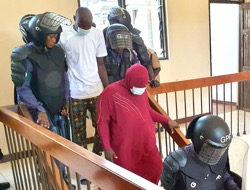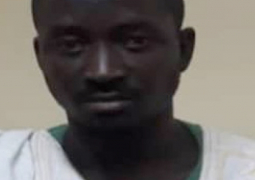
Amie Bojang, who is the second accused in the case, told the court that she was arrested on Thursday and taken to the Anti-Crime Unit until around 9 and later taken to the station where she was put in a cell.
She said that the following morning, she was brought out of the cell and sat beside the Charge Office until lunch was served and was called for lunch in a hall, where she eventually slept. Waking up, she said she took a walk outside where she was seated in the morning.
Asked if she was guarded by any officer, she responded that a female officer was sitting next to her. She further narrated that when she was arrested that afternoon at 5 pm, she was taken before a panel and was questioned and later proceeded to a big hall where she spent the night.
The room she was taken to, she explained, was not the premise of the Charge Office in the Anti-Crime Unit; rather it was another building next to that office.
Asked about the number of people that visited the complex the first day she was taken to the Anti-Crime, Amie responded that she did not know how many people entered the unit. But she said: “People were going in and out, and they normally dropped their phones at the gate.”
Proceeded with the cross-examination, Director of Public Prosecution, A.M. Yusuf, told the second accused: “I am putting it to you that you are lying, since you don’t know the entrance, to say that all the people that came used the entrance you entered.”
Defence counsel J Darboe objected to the question to the witness, arguing that the word "lying" be withdrawn.
The court ruled that section 204 of the Evidence Act did not entertain such expression, and asked the DPP to withdraw or replace the word "lying" with "not telling the truth." The DPP thus changed the word to "not telling the truth".
The accused, however, told the court that she was telling the truth.
Asked if the number of people who visited the unit was close to 100, the second accused told the court that she did not because that was not the purpose of her presence there.
The DPP told her that since her purpose was not to know the number of people, then she did not know the people that came there, but Amie Bojang said she would be able to recognise the people she saw there, and if she could see them, she would be able to recognise them.
There was no re-examination from Counsel Lamin J. Darboe, and the court discharged DW2 from the witness stand, while defence counsel L. Darboe closed his case in the mini-trial
On the issue of address to the court, DPP A.M. Yusuf said Counsel Lamin Mboge should not address the court during the voir dire as his client was not directly involved in it.
Counsel Lamin Mboge contended that his client should be charged together with the first accused and that separating them would go against the fair hearing guaranteed under section 25 of the Constitution.
In his ruling, Justice Jaiteh asserted that counsel Lamin Mboge had the right to address the court to establish the truth.
He explained that allowing the address would not prejudice the case, citing section 24 of the Constitution as supporting such practice in their jurisdiction.
The case was adjourned.


